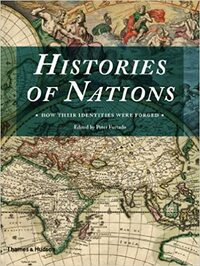Take a photo of a barcode or cover
Although I liked the idea, the book doesn't really work as a whole. It's a collection of essays about the shaping of nation states, its (brief) histories and the way its inhabitants look at themselves and the rest of the world accordingly. It's not only the differences in style, but notably the differences in approach between the different authors that make this far less interesting (and fun) to read than it should.
The result is a very mixed set of essays, some of which are pure historical, scholastic accounts with dates and names, and some are more philosophical in nature, avoiding almost all factual instances altogether.
The reason I'm giving this 2 stars (actually it's more 2.5 stars) is that some of these essays are virtually unreadable. I was very keen to learn more about the history and the nature of the Irish, for instance, but the way it was written made me not being able to remember a single thing I read. And that's a shame, because there are some truly insightful chapters in here as well.
The result is a very mixed set of essays, some of which are pure historical, scholastic accounts with dates and names, and some are more philosophical in nature, avoiding almost all factual instances altogether.
The reason I'm giving this 2 stars (actually it's more 2.5 stars) is that some of these essays are virtually unreadable. I was very keen to learn more about the history and the nature of the Irish, for instance, but the way it was written made me not being able to remember a single thing I read. And that's a shame, because there are some truly insightful chapters in here as well.
informative
reflective
slow-paced
informative
reflective
fast-paced
The stories nations tell about their histories reveal so much about the national conciousness therein. It's no surprise, then that the best of these essays were fantastic. But they were so short that some of the essays felt more like a list of events, or a flashpoint of one small view rather than a plurality. Also, I didn't like the way they ordered the chapters- there didn't seem to be much organizing factor, and I would have liked less of a focus on Western countries.
informative
reflective
fast-paced
Well curated and excellent concept. Would like to have seen more developing nations included and potentially some dialogue, e.g. two authors per country.
informative
reflective
I liked this book because it gave such a broad overview of some nations that I knew practically nothing about whilst also keeping me interested about topics I wouldn’t have thought I would be. However, I would have liked the ‘essays’ to be longer, often they came across sprawling and all over the place due to the amount of history they were trying to fit in in such a small amount of pages.
informative
reflective
medium-paced
informative
challenging
informative
reflective
fast-paced
Educational essays on the history of nations across the world. It’s very interesting to read the perspective of historians on their own countries’ history, even though it is of course just one perspective that is offered. Would recommend!


